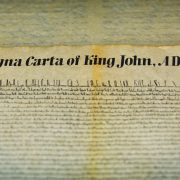Wikipedia has become a staple in each of our lives. No matter what information we may be in search of, Wikipedia either provides what we are looking for or offers a great launching off point to further research. And while most of us routinely use the site to aid us on our quest for knowledge, few know that the site was born out of a deep respect for the work of economist, F.A. Hayek.
The Knowledge Problem
As a college student at Auburn University, young Jimmy Wales, the founder of Wikipedia, had the pleasure of taking an economics course from Austrian economist, Mark Thornton. It was during this course that Wales was first introduced to the ideas of Hayek. Specifically intrigued by Hayek’s essay, The Use of Knowledge in Society.
In this essay, which was published in 1945, Hayek explains that one of the major problems with central planning is the amount of knowledge that would be required to make it work. Since information is dispersed among individuals, it would be impossible for central planners to set regulations that accounted for every single person’s wants and needs. They would simply not have enough information to answer to solve these problems.
If the main goal of was the organization of knowledge, then Wales, who is himself a subscriber to the Austrian school, believes there are two means of centralizing this information. First, governments and rulers around the globe could do their best to collect all this knowledge. Of course, once someone is the keeper of knowledge they also control who receives it. This, of course, is not decentralization at all. Even so, this is what has occurred for most of human history.
Access to state-gathered information has traditionally been guarded against reaching the masses of the people. Instead, the right to this knowledge was a privilege given to those in power, whether political or economic. Obviously, this was not an effective way to decentralize knowledge among the people. Additionally, while this is the best possible solution for those in power, with large populations of individuals it is unlikely that even force would yield the gathering of all information. There would still be an inefficient amount of knowledge—and an insufferable amount of state control.
The Wikipedia Solution
The second approach to the knowledge problem can be found by taking a closer look at Wikipedia. Since history has shown us that governments are not the best keepers of knowledge, it is best for this information to stay decentralized, but still accessible by all individuals. Wales explained Wikipedia by saying:
“Wikipedia begins with a very radical idea, that is for all of us to imagine a world in which every single person on the planet is given free access to the sum of all human knowledge. And that is what we are doing.”
Instead of state control, Wikipedia is managed by a voluntary community. Users are free to add information and edit. However, the edits are subject to review by the community itself. If there is a dispute over any of the information added to the site, the Wikipedia community utilizes private conflict resolution in which they discuss and debate amongst themselves, without the need for state authority. Wikipedia even has its own internal common law system to help settle any disagreements about site entries that may arise. So not only is Wikipedia making knowledge accessible to all, it is also paving the way for private dispute resolution methods that do not involve government courts.
And while Wales’ recognition of the knowledge problem would be impressive enough on its own, Hayek’s influence on Wikipedia does not end there. In the next installment, we will discuss how Wikipedia is yet another real-life example of spontaneous market order.













